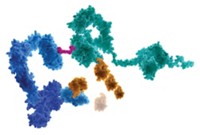Advertisement
Grab your lab coat. Let's get started
Welcome!
Welcome!
Create an account below to get 6 C&EN articles per month, receive newsletters and more - all free.
It seems this is your first time logging in online. Please enter the following information to continue.
As an ACS member you automatically get access to this site. All we need is few more details to create your reading experience.
Not you? Sign in with a different account.
Not you? Sign in with a different account.
ERROR 1
ERROR 1
ERROR 2
ERROR 2
ERROR 2
ERROR 2
ERROR 2
Password and Confirm password must match.
If you have an ACS member number, please enter it here so we can link this account to your membership. (optional)
ERROR 2
ACS values your privacy. By submitting your information, you are gaining access to C&EN and subscribing to our weekly newsletter. We use the information you provide to make your reading experience better, and we will never sell your data to third party members.
Business
Kymera launches with $30 million to tackle targeted protein degradation
Backed by Atlas Venture, the firm hopes to put its first compound in the clinic by 2020
by Lisa M. Jarvis
November 1, 2017
| A version of this story appeared in
Volume 95, Issue 44

Kymera Therapeutics has launched with $30 million in funding from Atlas Venture, Lilly Ventures, and Amgen Ventures. The firm intends to develop bifunctional small molecules that can tackle disease-causing proteins that have long stymied drug developers.
Kymera is the latest biotech company working on targeted protein degradation, a way of tagging troublesome proteins for the cellular trash bin.
Traditionally, small-molecule drugs work by blocking the activity of errant proteins. But that approach has limited drug developers to a small fraction of the thousands of proteins made by humans.
Kymera and other protein degradation firms want to use small molecules to coax the body into getting rid of troublesome proteins altogether—a strategy more often associated with RNA-based drugs.
To do that, they are taking advantage of the body’s own protein disposal system. When a protein’s time has come, it is tagged with ubiquitin so that it is recognized by the proteasome—the trash compactor of the cell—for removal. Kymera is designing small molecules that feature a protein-binding domain linked to a ubiquitin ligase-binding domain. Forcing the protein and ligase to nestle together causes the protein to be tagged for breakdown. The drug is then released to repeat the process.
Several well-funded biotech firms have emerged to exploit targeted protein degradation, including Arvinas, founded by Yale University chemist Craig Crews, and C4 Therapeutics, spun out of Dana-Farber Cancer Institute.
Most drug discovery efforts have relied on E3 ubiquitin ligases identified by Crews and the Dana-Farber team. “These two are the front runner ligases for various reasons, so the challenge in the field is, ‘Can we now expand this to other ligases?’” says University of Dundee chemist Alessio Ciulli, whose lab is working on protein degradation with Boehringer Ingelheim.
While Kymera isn’t dismissing the existing ligase toolbox, “we are going beyond those that are out there,” says its co-founder and chief technology officer, Nello Mainolfi. The biotech firm further distinguishes itself by using informatics to find the right protein target-ligase pairs and strong medicinal chemistry skills to design molecules, Mainolfi says.
Kymera will focus on immuno- oncology, autoimmune diseases, and fibrosis.




Join the conversation
Contact the reporter
Submit a Letter to the Editor for publication
Engage with us on Twitter